Looking to start playing darts but unsure which darts to begin with? Look no further! In this article, we will explore the world of darts and help you discover the best options for beginners to use. From weight to grip, we’ll delve into the important factors that can make all the difference in your dart throwing journey. So, whether you’re aiming to hit the bullseye or simply hoping to have some fun, read on to find out the perfect darts to get you started!
This image is property of darthelp.com.
Review contents
Best Darts for Beginners
Darts is a game that has been enjoyed by people of all ages for many years. Whether you are just starting out or looking to improve your skills, choosing the right darts can make a big difference in your performance. With so many options available, it can be overwhelming to know where to start. That’s why we have put together this comprehensive guide to help beginners find the best darts for their needs.
Weight of Darts
The weight of your darts is one of the most important factors to consider when choosing darts. The weight affects how the darts feel in your hand and how they fly through the air. As a beginner, it is best to start with darts that are not too heavy or too light.
Recommended Weight Range
For beginners, darts in the range of 18-20 grams are generally recommended. This weight range allows for a good balance between control and accuracy. It is important to find a weight that feels comfortable in your hand and allows you to throw with ease.
Experimenting with Different Weights
Every player is different, and what works for someone else may not work for you. That’s why it’s a good idea to experiment with different weights to find what feels best for you. Some players may find that they prefer a slightly lighter dart, while others may prefer a slightly heavier dart. It’s all about finding the weight that allows you to have the most control and accuracy.
Considerations for Junior Players
For younger players or those with smaller hands, it is important to choose darts that are suitable for their size and strength. Darts with a lower weight range, such as 16-18 grams, are often recommended for junior players. This allows them to develop proper throwing techniques without straining their muscles.
Material of Darts
The material of your darts can also have an impact on the overall performance. There are several different materials commonly used for darts, each with its own unique characteristics.
Brass Darts
Brass darts are a popular choice for beginners due to their affordability. They are generally lighter in weight and have a smooth finish. However, brass is not as durable as some other materials and can show signs of wear over time.
Tungsten Darts
Tungsten darts are considered to be the best option for serious players. They have a high density which allows for a slimmer barrel and tighter grouping. Tungsten darts are more durable than brass darts and provide better control and balance. However, they tend to be more expensive.
Steel Darts
Steel darts are another popular choice for players of all skill levels. They are heavier and more durable than brass darts, making them a good option for beginners. Steel darts also offer a wider range of styles and designs.
Nickel-Silver Darts
Nickel-silver darts are a good middle ground between brass and tungsten darts. They offer a good balance of affordability, durability, and performance. Nickel-silver darts are often recommended for intermediate players who are looking to upgrade their darts.
Aluminum Darts
Aluminum darts are lightweight and often used for soft-tip darts. They are not as common in steel-tip darts due to their lighter weight and less durability. Aluminum darts are a good choice for beginners who prefer a lighter dart or are playing in leagues that require soft-tip darts.
Type of Darts
The type of darts you choose will depend on the type of game you plan to play. There are two main types of darts: soft-tip darts and steel-tip darts.
Soft-tip Darts
Soft-tip darts are commonly used for electronic dartboards. They have a plastic tip that is designed to stick into the electronic scoring board. Soft-tip darts are typically lighter in weight and have a larger barrel to accommodate the plastic tip. They are a popular choice for beginners due to their ease of use and availability.
Steel-tip Darts
Steel-tip darts are used for traditional dartboards made of sisal or bristle. They have a sharp metal tip that is designed to stick into the board. Steel-tip darts are typically heavier and have a slimmer barrel compared to soft-tip darts. They are the preferred choice for players who compete in tournaments or play on standard dartboards.
Grip Style
The grip style refers to the texture and design of the barrel that allows you to grip the darts. There are several different grip styles to choose from, each offering a unique feel and control.
Front-Weighted Darts
Front-weighted darts, also known as “bomb-style” darts, have the majority of the weight located near the front of the barrel. This style of dart is favored by players who use a longer follow-through in their throw. Front-weighted darts provide a stable flight and are often recommended for beginners.
Rear-Weighted Darts
Rear-weighted darts have the majority of the weight located towards the back of the barrel. This style of dart is favored by players who prefer a shorter, quick throw. Rear-weighted darts offer a smooth release and good balance.
Centre-Weighted Darts
Centre-weighted darts have the weight evenly distributed throughout the barrel. This style of dart is a versatile option that can work well for players of all styles. Centre-weighted darts offer a balance between stability and control.
Parallel Barrel Darts
Parallel barrel darts have a consistent diameter along the entire length of the barrel. This style of dart provides a consistent grip and is favored by players who use a “fingertip” grip.
Pencil Barrel Darts
Pencil barrel darts have a slim profile and are often used by players who prefer a lighter dart. This style of dart allows for a tight grouping and precise throws.
Scallop Barrel Darts
Scallop barrel darts have small grooves or cuts along the barrel, providing additional grip points. This style of dart is favored by players who use a “claw” or “hammer” grip.
This image is property of darthelp.com.
Flight Shape
The flight shape refers to the design of the fins at the back of the dart. The flight shape can affect the stability and trajectory of the dart.
Standard Shape
Standard shape flights are the most common and offer a good balance between stability and speed. They provide a consistent flight and are a popular choice for beginners.
Slim Shape
Slim shape flights are smaller and offer less surface area. They are favored by players who prefer a faster, more direct throw.
Kite Shape
Kite shape flights have a rounded, wider top and taper down towards the bottom. They offer stability and are often used by players who use a more “lob” style throw.
Teardrop Shape
Teardrop shape flights have a narrow top and wider bottom. They provide a more stable flight and are often used by players who use a “smooth” or “glide” style throw.
Shaft Length
The shaft length refers to the part of the dart that attaches the flight to the barrel. The length of the shaft can affect the stability and balance of the dart.
Short Shafts
Short shafts are recommended for players who prefer a tighter grouping and a more compact dart. They offer less stability but provide a faster, more direct throw.
Medium Shafts
Medium shafts are the most common and offer a good balance between stability and speed. They are a popular choice for players of all skill levels.
Long Shafts
Long shafts provide more stability but can reduce the speed of the throw. They are favored by players who prefer a slower, more controlled throw.
This image is property of i.ytimg.com.
Cost
When it comes to purchasing darts, cost is often an important factor to consider. Darts can range in price from budget-friendly options to premium sets.
Budget-Friendly Darts
Budget-friendly darts are a good option for beginners who are just starting out or on a tight budget. These darts are typically made of brass or nickel-silver and offer a decent level of performance without breaking the bank.
Mid-Range Darts
Mid-range darts offer a higher level of performance and durability compared to budget-friendly options. They are often made of tungsten or steel and are a great choice for players who are looking to upgrade their darts.
Premium Darts
Premium darts are the top-of-the-line option for serious players. These darts are made of high-quality materials such as tungsten and offer exceptional performance and durability. They are often used by professional players and those who compete in tournaments.
Brand Reputation
When choosing darts, it is important to consider the reputation of the brand. There are several well-known brands in the dart industry that have a proven track record of producing high-quality darts.
Well-Known Brands
Some of the well-known brands in the dart industry include Unicorn, Target, Winmau, and Harrows. These brands have been around for many years and are known for their commitment to quality and innovation.
Quality Assurance
Choosing a reputable brand ensures that you are getting a quality product that has been tested and inspected for performance and durability. These brands often offer warranties and customer support to ensure customer satisfaction.
Customer Reviews
Reading customer reviews can provide valuable insight into the performance and durability of a particular set of darts. Take the time to research and read reviews to see what other players have to say about the darts you are considering.
This image is property of Amazon.com.
Personal Preference
While all these factors are important to consider when choosing darts, personal preference should also play a role in your decision. Ultimately, you are the one who will be throwing the darts, so it is important to choose a set that feels comfortable and suits your individual style of play.
Accessories Included
Finally, consider what accessories are included with the darts. Some sets may come with extra flights, additional shafts, or a dart case. These additional accessories can be convenient and save you money in the long run.
In conclusion, choosing the best darts for beginners involves considering factors such as weight, material, type, grip style, flight shape, shaft length, cost, brand reputation, personal preference, and accessories included. By taking the time to research and try out different options, beginners can find the perfect set of darts that suits their needs and helps improve their game. Remember, practice makes perfect, and with the right darts, you’ll be hitting those bullseyes in no time!
This image is property of www.ignatgames.com.



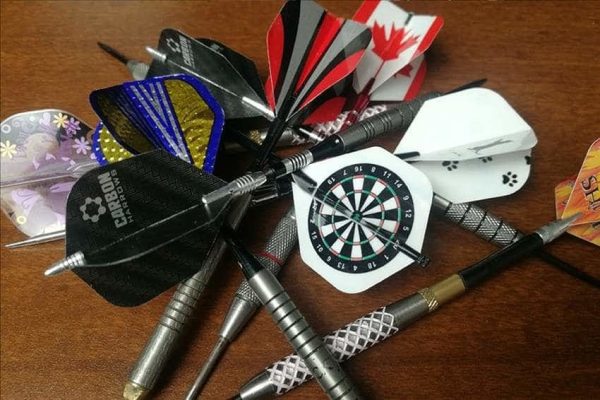
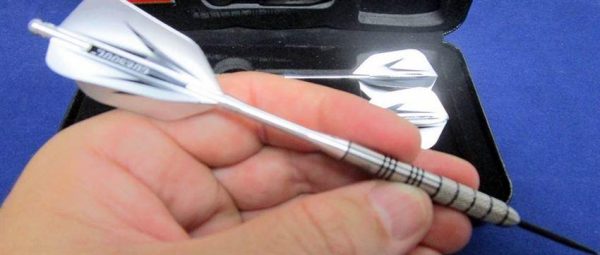

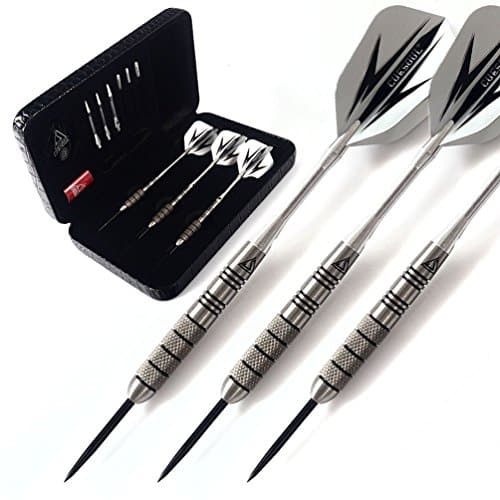
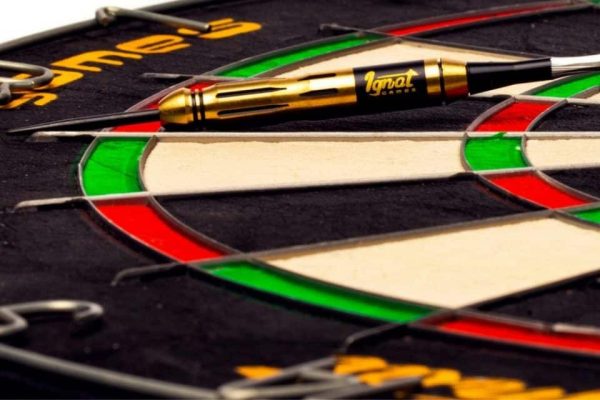




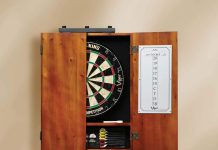
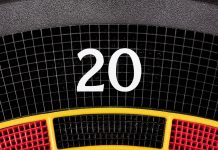














![Best Outdoor Dartboards [Reviews and Buying Guide 2024] Best Outdoor Dartboards](https://gamersets.com/wp-content/uploads/2022/12/Best-Outdoor-Dartboards-100x70.jpg)

![Best Mini Air Hockey Table [Reviews & Buying Guide 2024] Best mini air hockey table](https://gamersets.com/wp-content/uploads/2022/10/Best-mini-air-hockey-table-100x70.jpg)







